Table of Contents
How to Prepare for a Power Outage in Winter
1. Winterproof Your Home
Before winter creeps in, prepare your home as best you can to keep the warmth in during an outage. Insulate your attic and walls and block drafts using weatherstrips, caulking, or even window film. Draft guards can be attached to the bottom of doors to prevent heat from escaping. Although weatherizing your home might be costly, these solutions can also reduce your utility bills in the long run (yay!).
2. Prepare a Power Outage Survival Kit
With any luck, you’ll know well in advance if there’s a storm on the way that will likely cause a winter power outage, but these essentials will get you through, especially when it’s unexpected.
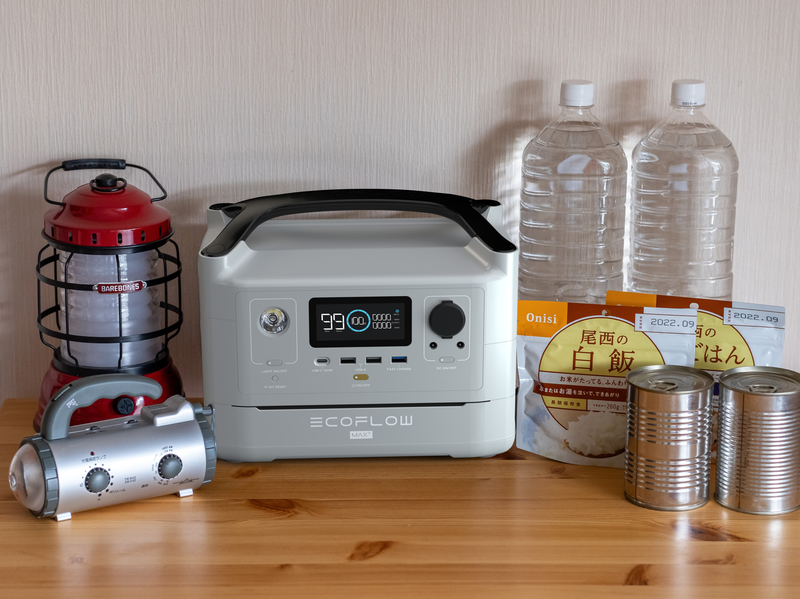
Here’s a list of suggestions for your winter outage emergency kit:
- Bottled water
- Non-perishable food (canned goods and nuts etc.)
- Battery-powered radio (and batteries)
- First aid kit and necessary medication
- Pet supplies (if required)
- Set of warm clothes for each family member
- Essential documents (or have access to them)
- Blankets or bedding
- A fully recharged portable power station
3. Prepare Food & Water
Store several water bottles and non-perishable foods such as canned beans and vegetables, dried fruits, and nuts. Have enough for a few days for each person in your home. When you know a storm is on the way, fill your bathtub with water for washing, and have a bucket handy for flushing the toilet, just in case your water supply gets affected. If there’s a danger of your pipes freezing, locate your main water valve and shut it off before the storm hits.

4. Warm Clothes
Make sure to have winter clothes ready for all your family members. Several layers are better than one heavier layer, while a hat will prevent heat from escaping from the top of your head. Scarves can protect the lungs from the cold, while mittens generate more heat for your hands since they keep your fingers together. Keep an extra set of clothing and shoes handy for an emergency.
5. Torches & Radios
If you’re not using a portable power station for lights or to power communication devices, keep battery-powered or hand-crank torches and radios handy. Radios can keep you in the loop with local news, weather reports, and emergency information. And, while it’s tempting to create a cozy ambiance with candles, torches are much safer and more reliable, especially during a storm.
6. Fill Your Vehicle With Gas
Make sure your car or truck is ready if you need to evacuate. Fill your vehicle’s gas tank, or store a canister at home if you need it. Since gas stations use electricity, fuel tends to be unavailable during an outage. Gas in the tank also prevents fuel lines from freezing during a winter storm.
7. Prep an Old School Corded Phone
Cell phones should work during a power outage, although calls might not make it through, especially during emergencies. While a corded phone doesn’t guarantee you’ll make contact with a family member, it means you can save your cell phone battery for emergencies. Alternatively, if you’ve prepared a portable power station, there’s no need to worry about your cell phone battery!
8. Stock up on Fuel for a Wood Burning Fire
If you have a wood-burning or gas fire, store enough fuel to keep at least one room warm. Many gas fires don’t require a pilot ignition to start, so you can use your fireplace to stay warm as long as the room is well ventilated.
9. Turn Down Your Fridge or Freezer
To keep your food cooler for longer:
- Turn down the temperature on your refrigerator or freezer before an outage happens.
- Move milk and meat into the freezer to keep them cold.
- Avoid opening your fridge for as long as possible to prevent your goods from perishing.
10. Prepare Medication
If you or a family member need to take regular medication, make sure to renew your prescription, allowing for an extended outage that could last up to a week.
11. Prepare a Portable Power Station
Purchasing a portable power station will ensure you avoid many power outage issues that occur during a winter outage. A portable power station is a battery-powered alternative to a gas generator that can be used inside (or outside) during a blackout.
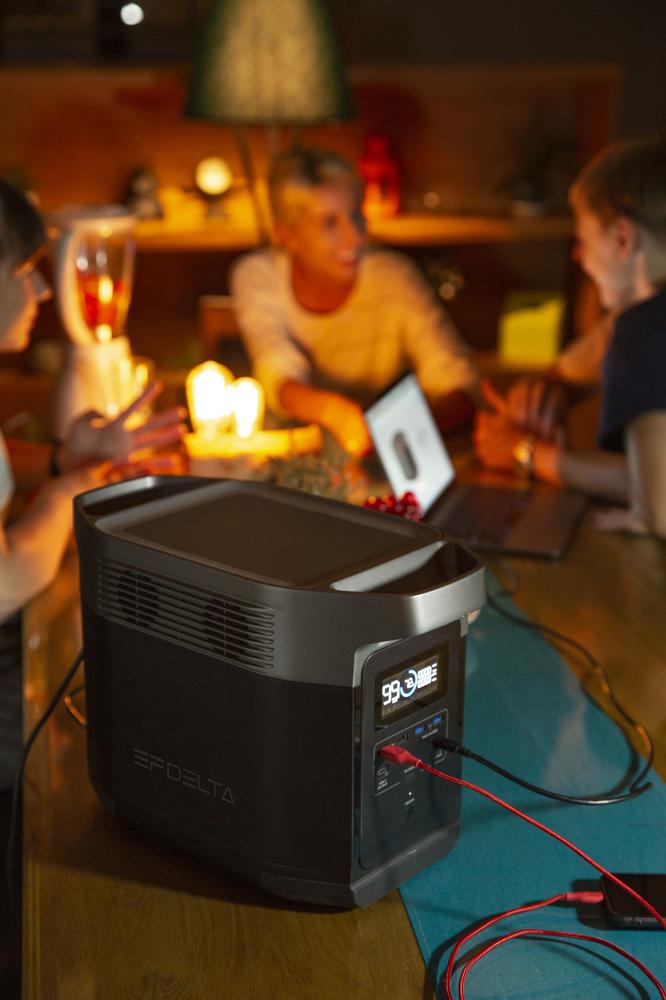
While you can choose to power certain appliances or rooms in your home, you can also prepare your entire home for power blackouts with several batteries, solar panels, and Smart Home Panel.
Using a portable power station and an electric hot plate, you can cook basic dishes or boil a kettle to make a hot drink or meal. Keep the food in your fridge or freezer from going off, with a battery that will keep them running for several days.
You can also avoid storing additional fuel for a wood or gas stove and run an electric heater instead. There’s no need to worry about ventilation, either since the power is clean and without fumes. Even with a small portable power station, you can keep your phone charged, so you never need to worry about your cell phone battery dying. You don’t need to rely on the radio for information; you can keep your television or laptop powered up or charged with a power station.
12. Unplug Appliances
When the power comes back on, there may be an electrical surge that damages your appliances. Find out which appliances need to be unplugged before an outage or unplug everything to avoid later issues. Appliances with a microprocessor are the ones to look out for, such as TVs, computers, microwaves, dishwashers, washing machines, and refrigerators.
How to Stay Warm Without Power
Hopefully, you’ve had enough warning to prepare for a power outage. A portable power station can help keep your family warm during a power outage, allowing you to boil a kettle for a hot drink, run a heater, or even cook a warm meal with a hot plate or microwave. After the storm passes, use portable solar panels during the day to recharge your portable power station.
A portable battery can make your life easier during a power outage, but there are still ways you can prepare for a few nights without a heat source.
13. Live in One Room
To store what little warmth you might have once the power goes out, keep everyone together in a room with a heat source, such as a wood or gas burner. If you don’t have a burner or fire, stay in a small space, your body heat will keep you warmer for longer.
14. Block Drafts
Avoid opening doors where possible and block any drafts using towels and blankets, especially on windows and doors. Cover windows with curtains or blinds to keep warmth in during the night.
15. Layer Up
Make sure to cover up as much of yourself as possible and wear plenty of layers. Thermal underwear and wool socks are good first layers, then pants, loose shirts, and coats. Hats, mittens, and warm boots will also prevent heat from escaping your extremities.
Things to Do After an Outage
When the power returns, things may not go back to normal straight away. You may continue to have more minor outages, or your home and neighborhood may have taken the brunt of a storm or high winds.
16. Take Care Outside
Winter storms can often take down power poles and lines, so take extra care when going outside after an outage. Don’t handle trees or branches touching electricity lines, either, as these downed power lines could well be live.
17. Check for Damage
As well as storm damage, check for burst or broken pipes. Test your water heater once the electricity is back on. If the water in the tank won’t heat up or it keeps tripping the electrics, you may need to call a plumber. If your fridge has been off for more than 4 hours, you might need to throw away food that has spoiled. Freezers, however, can keep cold for around 24 hours, especially if they’re full.
18. Restock Your Supplies
Replenish your survival kit with all the items you’ve used, focusing on winter necessities. If you’re not using solar panels, take this opportunity to recharge your portable power station using an AC outlet. Replace batteries, non-perishable food, and water.
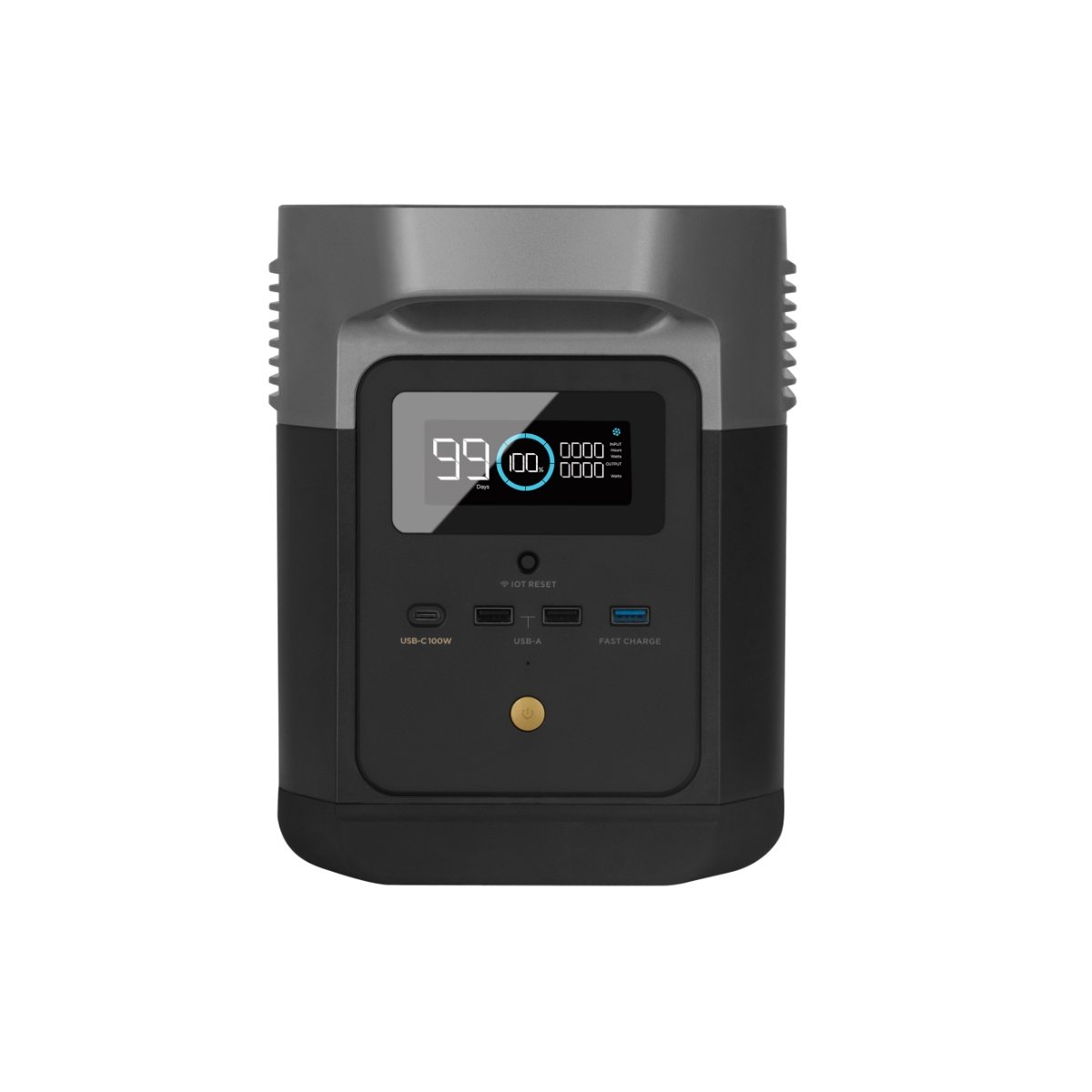
DELTA mini
| Capacity 882Wh |
| Phone (11W) 62 Charges |
| Laptop 60W 12 Charges |
| Mini Fridge 12 Hours |
| Blender (500W) 1.5 Hours |
| Coffee Machine (1000W) 0.7 Hours |
| Air Fryer (1500W) 0.5 Hours |
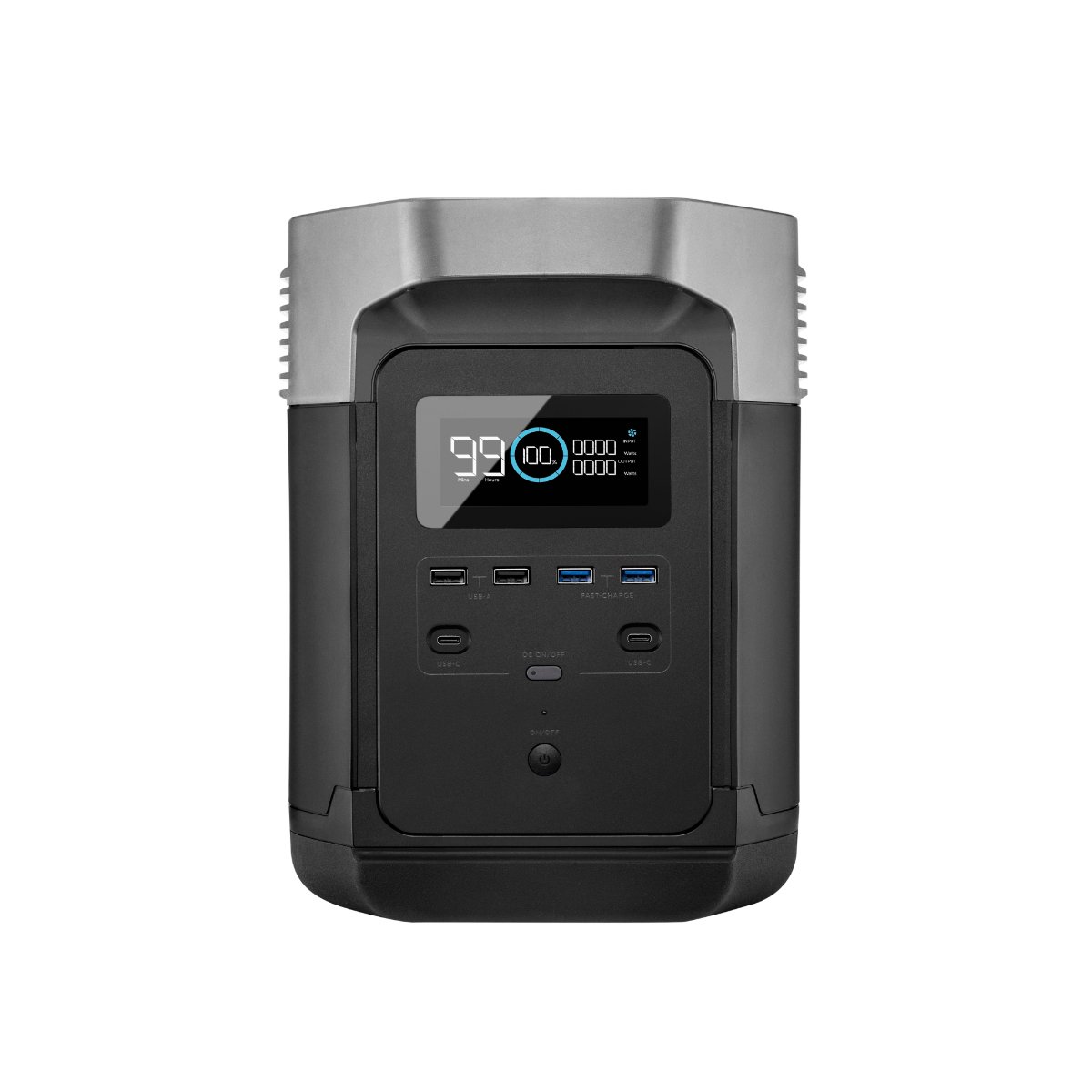
DELTA
| Capacity 1260Wh |
| Phone (11W) 104 Charges |
| Laptop 60W 19 Charges |
| Mini Fridge 19 Hours |
| Blender (500W) 2.1 Hours |
| Coffee Machine (1000W) 1.1 Hours |
| Air Fryer (1500W) 0.7 Hours |
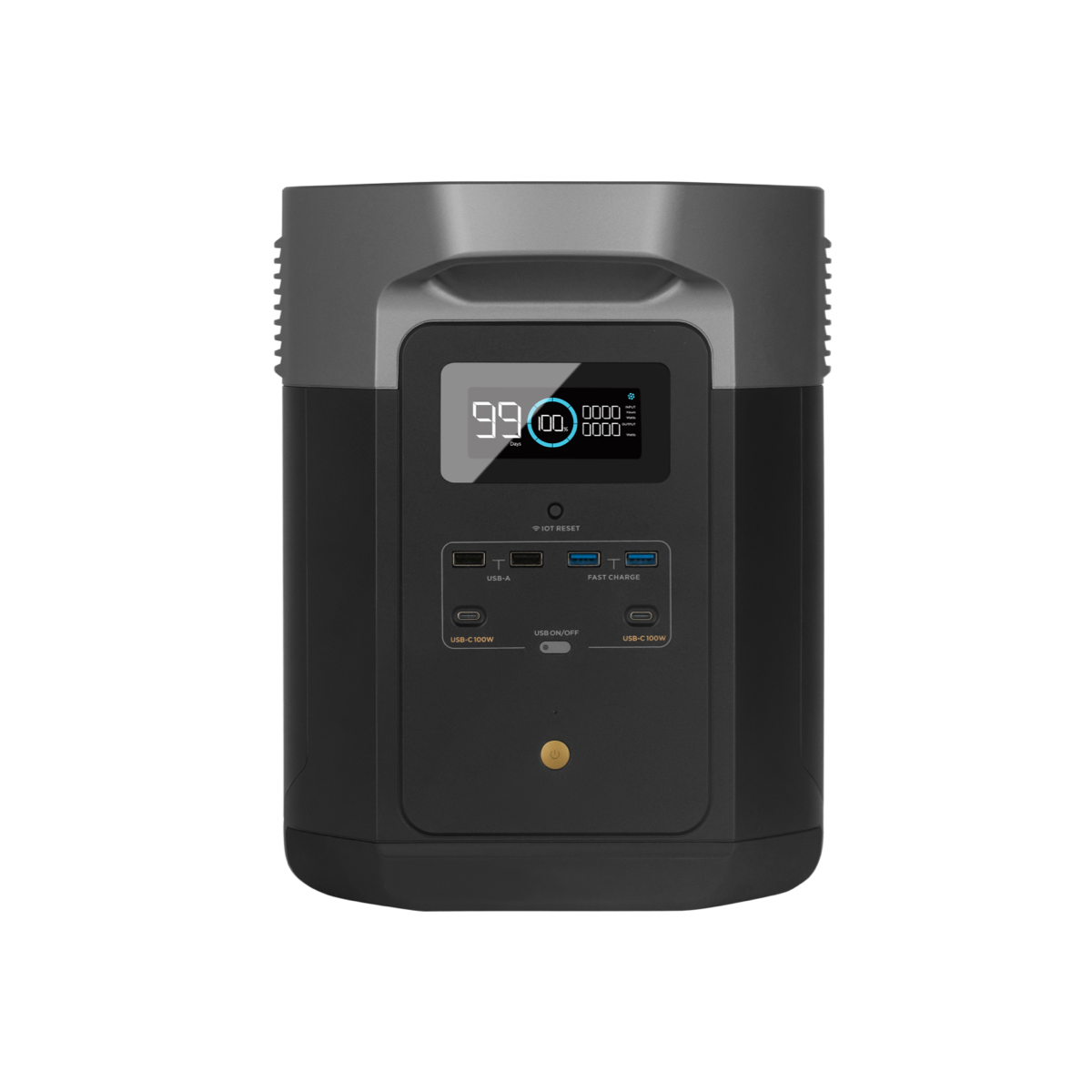
DELTA Max
| Capacity 2016Wh |
| Phone (11W) 175 Charges |
| Laptop 60W 32 Charges |
| Mini Fridge 33 Hours |
| Blender (500W) 3.5 Hours |
| Coffee Machine (1000W) 1.9 Hours |
| Air Fryer (1500W) 1.2 Hours |
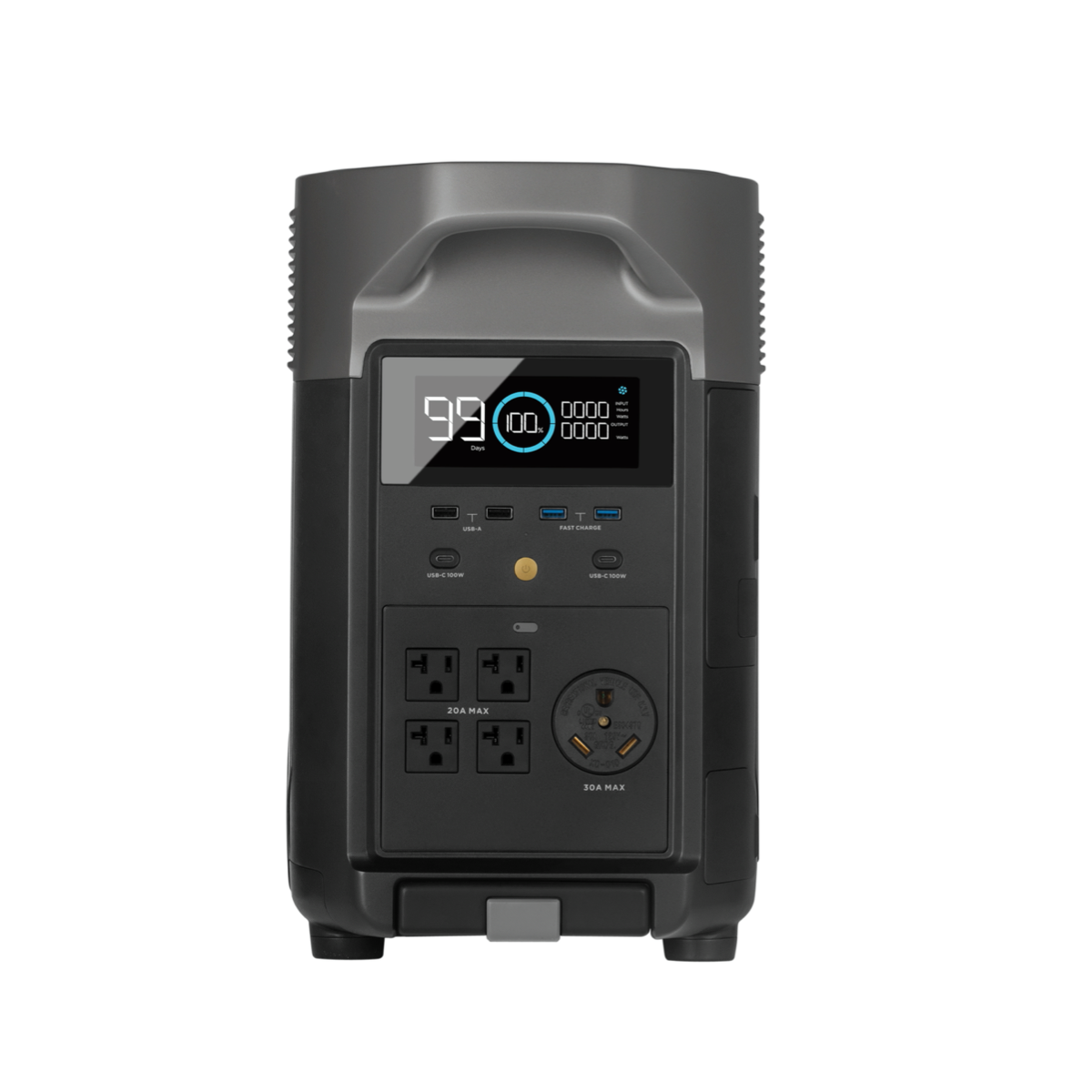
DELTA Pro
| Capacity 3600Wh |
| Phone (11W) 313 Charges |
| Laptop 60W 57 Charges |
| Mini Fridge 57 Hours |
| Blender (500W) 6.5 Hours |
| Coffee Machine (1000W) 3.3 Hours |
| Air Fryer (1500W) 2.2 Hours |







